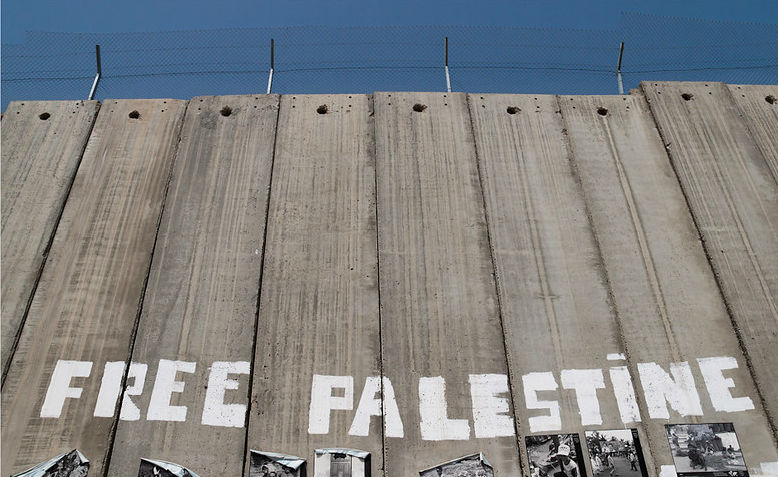 Section of the apartheid wall in Bethlehem, Palestine. Photo: Flickr/Montecruz Foto
Section of the apartheid wall in Bethlehem, Palestine. Photo: Flickr/Montecruz Foto
The fight for a free Palestine will not stop until there is justice and equality for all, writes Gabriel Polley
November 2019 will be remembered as a dark chapter in Palestine’s history – not that there have been many bright moments since the ethnic cleansing of Palestine in 1948, and Israel’s military occupation of the Palestinian territories in June 1967.
On 11th November, Omar al-Badawi was killed when Israeli soldiers stormed his neighbourhood in the al-Arroub refugee camp in the West Bank. Pursuing protestors throwing stones at heavily armoured military jeeps, an Israeli soldier shot al-Badawi dead as he tried to extinguish a fire caused by a tear gas canister. He had not thrown a single stone; he was still wearing his slippers. He was 22.
The same day, several days of airstrikes on the Gaza Strip began after Israel’s targeting of a Palestinian militant. The assault was not as long as Israel’s summer 2014 assault which left 1,462 civilians dead, yet its consequences nevertheless were tragic. Almost half the 34 Palestinians killed were civilians. Eight members, including five children, of the Abu Malhous/Sawarka family, were killed by an Israeli airstrike on November 14th. A ninth member died from his injuries on 22nd November. The humanitarian situation in the small area, under blockade by land, sea and sky, remains dire; a UN report from 2017, warned that in 2020, the Gaza Strip would be unliveable.
On November 15th, Muath Amarneh, a Palestinian photographer, was injured when Israeli forces used live fire to disperse a demonstration in the village of Surif. Amarneh, one of 60 Palestinian journalists to have been targeted with live fire this year, lost his left eye, leading to a global display of solidarity with supporters of Palestinian rights posting photographs of themselves covering an eye on social media.
Despite these repeated violations of human rights, on November 18th the Trump administration gave a boon to the Israeli occupation when the Secretary of State Mike Pompeo announced the US government no longer considered Israeli settlements inconsistent with international law. Over 200 settlements, which control over 40% of the West Bank, continue to be viewed as illegal by the rest of the international community.
The US announcement follows American recognition last year of Jerusalem as Israel’s capital, and of Israel’s sovereignty over the Syrian Golan Heights. These moves are Trump’s gifts to his close ally Israel’s prime minister Netanyahu, who is under investigation for corruption, and has failed twice to achieve a coalition after indecisive elections this year.
On 25th November, the local director of Human Rights Watch, Omar Shakir, was deported by the Israeli authorities under a 2017 law denying access to Israel and Palestine to those supportive of the Boycott, Divestment and Sanctions movement. HRW has claimed that Shakir is not a supporter of BDS, but has worked to hold Israel accountable for the abuses committed in Palestine.
Tragedy occurred on 26th November, when Sami Abu Diak, 37, died of cancer in an Israeli prison. A prisoner since 2002, Abu Diak’s condition worsened as a result of a botched operation in a prison hospital, and subsequent medical negligence. His final wish, to die in his mother’s arms, was denied by the prison authorities.
Sadly, none of these occurrences – and they are by no means an exhaustive list – were exceptions; Palestinian suffering has been the rule. Successive Israeli governments have pursued the same policies of apartheid. All hope from the peace process that started in the early 1990s has long faded for Palestinians.
All this seems far away for most British voters, as they weigh their options for the election on December 12th. Yet the issue of Palestinian suffering, and the cynical weaponization of antisemitism, are ever-present through the repeated allegations of antisemitism made towards Labour leader Jeremy Corbyn by his political rivals and the media.
Corbyn, an anti-racist campaigner for decades, has been a consistent supporter of Palestinian human rights and an advocate of the two-state solution on 1967 borders – the position of the mainstream international community. As many – Jews, Palestinians and others – have pointed out, supporting Palestinian rights by no means equates to antisemitism. Yet the accusations against Corbyn have threatened to obscure Labour’s progressive policies which have broad popularity amongst voters, such as the renationalisation of the rail network, a Green New Deal, and the suspension of arms sales to Saudi Arabia as well as to Israel.
Apologists for the Israeli occupation frequently accuse activists for Palestinian rights of “singling out” Israel, when there are many human rights-abusing around the world. With each day, this accusation holds less water – you will find Palestine activists speaking out on India’s crimes in Kashmir; against Turkey’s invasion of northern Syria and assault on the Kurdish population; against attacks on democracy in Latin America. You will find them on the climate strike demonstrations. You will find them taking a stand against antisemitism and Islamophobia wherever they appear, and opposing the common enemy of Jews, Muslims and all who believe in equality: the rise of the far-right.
As the roll-call of Israel’s repressive actions in the occupied Palestinian territories in the month of November alone demonstrates, Palestinians have never been so desperately in need of friends around the world. That is why, if one of the aims of those so vocally accusing Labour of antisemitism is to silence our voices, they will fail. Palestine’s real friends stand for justice for all, and equality for everyone between the Jordan River and the Mediterranean Sea.

